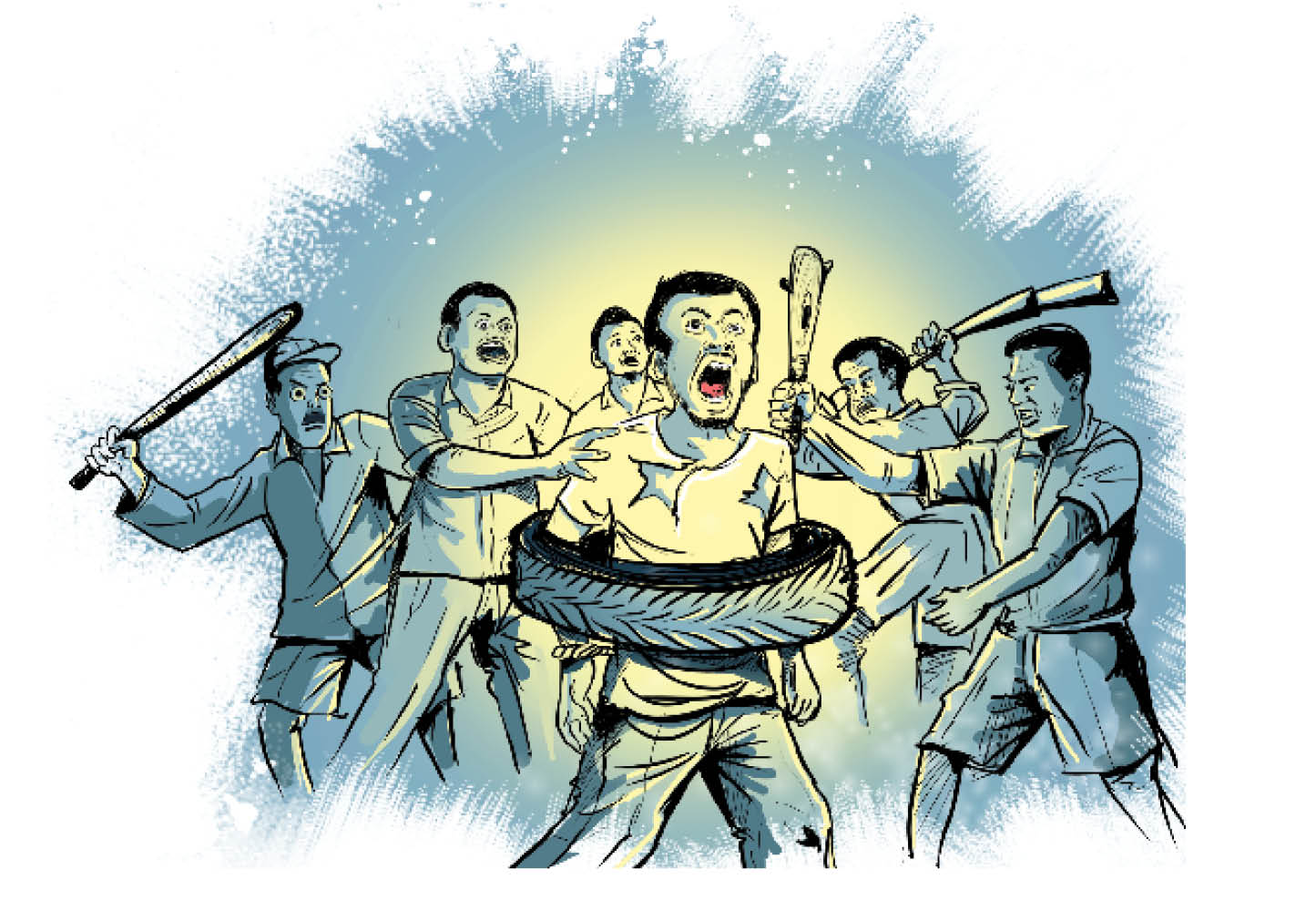Trigger Warning: This content describes scenes of intense violence, gore, or cruelty, which could be distressing for some readers. Viewer discretion is advised.
On November 19, 2021, life was snuffed out of a 16-year Anthony Okpahefufe in Yala, Cross River State, southern Nigeria
Okpahefufe’s crime was being friends with two teenagers that allegedly robbed a store. It was reported that Okpahefufe was helping his grandmother with chores when the robbery took place.
Okpahefufe and the two alleged thieves were dragged to the market square by an irate mob. They were stripped naked and beaten, and a rod was inserted into Okpahefufe’s anus.
Soon enough, the executors poured petrol on the pleading teenagers, put an abandoned tire on their necks and lit them up. The irate mob never left the scene until their bodies were burnt beyond recognition.
Up until now, there is no public report of the police investigating the issue nor arrest being made.
Okpahefufe’s story is no different from Saheed, popularly called Baba Ibe. Saheed was reportedly lynched by some residents of the Amisu, Babasale and Oke Itunu areas of Ibadan, Oyo state.
The mob had accused Saheed of being part of a group of robbers terrorizing their area and had killed him, to the glee of passersby.
But in a twist, the victim was later identified as suffering from a mental illness.
The police only arrived at the scene long after the mob were done.
There is no report of an arrest, despite warnings by the then police commissioner in the state that perpetrators of jungle justice will be dealt with.
Okpahefufe and Saheed are only two of many other Nigerians who never had their day in court but fell to the stick and stones of a red-eyed mob. But why is jungle justice still a phenomenon in Africa’s largest democracy? Why is the mob always the accuser, the judge and the executioner?
Is it a matter of trust?
Jungle justice in Nigeria is primarily caused by a lack of trust in the formal justice system and a perceived need for immediate retribution due to slow or ineffective law enforcement responses. Additionally, socio-economic disparities, widespread corruption, and a weak rule of law further contribute to the prevalence of mob justice incidents.
A 2014 survey by NOI polls revealed that 43% of Nigerians have witnessed a form of mob attack. Between 2019 and 2022, 391 deaths by mob incidents were reported, averaging about one dead every four days. 223 of those deaths were in the south, and 168 in the Northern part of Nigeria.
These incidents continue to underscore a lack of trust in Nigeria’s justice system, made up of the police and the judiciary.
Nigerians believe that corruption within the police soils their inability to diligently prosecute criminal cases brought to them, with many even theorising about an alliance between criminal elements in their communities and law enforcement agents.
There are many who have alleged that criminals handed to the police have either disappeared into thin air or are immediately seen roaming the streets after paying bribes to corrupt police officers.
There is also a lack of trust in the nation’s judiciary. A survey of Nigerians across the six geopolitical regions in Nigeria showed that 71.2% of Nigerians hold the opinion that the Judicial system is not fair.
Also, a paper on mob justice in Nigeria stressed that the continuous delays in the dispensation of justice or delay in the conclusion of criminal cases, which in most cases often lead to impunity, have dashed the hope of common Nigerians in search of justice.
The judiciary’s inability to deliver a judgment that is perceived as free and fair undermines public faith in the legal system. Hence, brewing a situation where citizens make themselves judges and hangmen.
Can we roll back?
To effectively put an end to jungle justice in Nigeria, a comprehensive approach is required, involving multiple stakeholders and addressing underlying causes.
Strengthening the formal justice system is of paramount importance. This entails enhancing the efficiency and effectiveness of law enforcement agencies and ensuring timely and fair judicial processes.
By increasing the number of well-trained and equipped police officers and providing the necessary resources to the judiciary, citizens can have greater confidence in the state’s ability to dispense justice. This, in turn, will reduce the perceived need for immediate retribution through mob violence.
Addressing the root causes of jungle justice requires tackling socio-economic issues that contribute to frustration and a lack of trust in the formal justice system. Efforts to alleviate poverty, create employment opportunities, and reduce inequality can foster an environment where people have greater confidence that their concerns will be addressed through legal channels.
Moreover, law enforcement reforms are necessary to combat abuses of power and corruption within the police force. Implementing accountability measures and regular training on human rights and ethical conduct for officers can improve public perception and trust in the system.
Promoting victim protection and support is crucial to dissuading individuals from resorting to mob violence. By ensuring that victims of crimes have access to support services, such as counselling and legal aid, they may feel more empowered to seek justice through the formal legal system.
Public accountability plays a vital role in deterring jungle justice incidents. Publicly prosecuting those involved in mob violence sends a strong message that such acts will not be tolerated and that the formal justice system will address crimes committed.
Additionally, establishing mechanisms for monitoring and reporting jungle justice incidents can provide critical data for targeted interventions and evidence-based policy decisions. This multi-faceted approach, involving government institutions, civil society organisations, communities, and the public, is essential to bring an end to the troubling phenomenon of jungle justice in Nigeria.
Trigger Warning: This content describes scenes of intense violence, gore, or cruelty, which could be distressing for some readers. Viewer discretion is advised.
On November 19, 2021, 16-year-old Anthony Okpahefufe was killed by a mob in Yala, Cross River State, Nigeria, after being accused of associating with two teenagers who robbed a store. Despite evidence that Okpahefufe was innocent, he and the others were beaten and burned alive.
A similar case involved Saheed, also known as Baba Ibe, who was lynched in Ibadan. Saheed, later identified as mentally ill, was wrongly accused of robbery and killed by a mob.
Both incidents illustrate the problem of jungle justice in Nigeria, a phenomenon rooted in the public's lack of trust in the formal justice system, characterized by slow responses, corruption, and socio-economic disparities. A 2014 survey indicated that 43% of Nigerians have witnessed mob attacks, with 391 deaths reported between 2019 and 2022.
To combat jungle justice, Nigeria needs a multi-faceted approach, including strengthening the justice system, addressing socio-economic issues, implementing law enforcement reforms, protecting victims, and ensuring public accountability through fair judicial processes and robust monitoring mechanisms.






